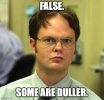- Joined
- Jul 3, 2019
- Messages
- 14,799
I think the pitfall here is that "sharpness" is usually "perceived sharpness".
There's a lot of factors, as mentioned above, in perceived sharpness.
To play along, however, I would usually go for the steel that I could make sharp to my satisfaction.
(provided, of course, it was a steel suitable for knives and of proper heat treatment)
I'm not really concerned about whether or not the edge will be retained for 20 years if it doesn't take a good edge.
There's a lot of factors, as mentioned above, in perceived sharpness.
To play along, however, I would usually go for the steel that I could make sharp to my satisfaction.
(provided, of course, it was a steel suitable for knives and of proper heat treatment)
I'm not really concerned about whether or not the edge will be retained for 20 years if it doesn't take a good edge.

